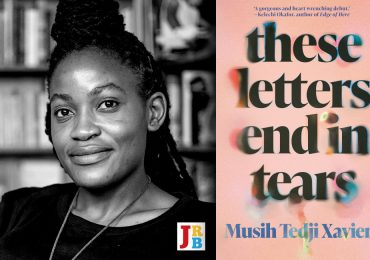Wamuwi Mbao reviews Diana Evans’s novel Ordinary People, which has been longlisted for the Rathbones Folio Prize and the Women’s Prize for Fiction.
 Ordinary People
Ordinary People
Diana Evans
Vintage Publishing, 2018
I first heard John Legend’s debut album Get Lifted midway through the first decade of the new millennium. I was an undergraduate, gathering together various ideas and concepts about being in the world. Legend’s album was a landmark for me and my male friends. It is a consummate work of Black soul music, arching a compelling story of love, betrayal, loss and intimacy through fourteen tightly-produced songs that evoke Curtis Mayfield and Sly and the Family Stone. It was, we thought, a blueprint for a different kind of conversation: who could hear Legend defiantly croon—
You know we’ve been struggling for such a long time
Working here and there just to get by
It’s finally time for me to get mine
—and not experience a swell of pride? We wanted to be as smooth and sophisticated as John Legend, as authoritative in our success and our wooing and flirting. It was the soundtrack of a mood whose ascendancy reached its euphoric climax in Barack Obama’s first presidential election victory. This is neo-soul, the evocation of what is awesome about the past, stirred effortlessly into the present. Barry Obama knew it. John Legend certainly knew it.
The problem, as we would soon discover, is that the mood was actually the experience of failed transcendence, the comprehension that what you were witnessing was the trace of something already vanished. Legend’s album, fifteen years on, sounds like what it always was: an elegy for something hopeful but illusory. That emptiness is the core of Diana Evans’ novel Ordinary People, in which two couples confront the fragility of their lives in the post-terror first world.
I say post-terror because Ordinary People is precisely about the impossibility of living on in the shadow of disaster. The majority of the story centres around the long-engaged Melissa and Michael, whose lives are caught in the reeling death-spiral of the prosperity boom heralded when Harold Macmillan proclaimed, in 1957, ‘most of our people have never had it so good’. They have cars and jobs and friends and things, and they don’t know what to do with it all. Michael has ‘a firm, recession-proof job as a corporate responsibility coordinator for a management company’. Melissa writes a column for a fashion magazine. Perfect. Yet, after thirteen years together, they are steadily losing interest in each other. With marriage a sword of Damocles hanging gloomily over them, neither can compellingly answer the question the novel is using them to pose: why marry, now?
Joining this hapless pair are their friends Stephanie and Damian, no less entangled in themselves, but with a marriage to show for it. Stephanie finds relief from her anxiety in the routine of raising their three children. Damian is frustrated because he believes he deserves better than his current job (that is to say, fate) researching the effect of solar heat on large glass areas in multistorey blocks of flats. He has retreated into himself, cudgelled by his bombastic father-in-law who supplies one of the novel’s more caustic bien pensant wisdoms:
[…] what makes people unhappy a lot of the time is that they think they should live outside the box. They think they’re better than their lot. But really, we arrive where we arrive in accordance with our abilities and potential.
Not a consoling thought by any measure. And so the two couples are borne along on a sea of failed communication and naive hope, all of it burnished by the author’s fine grasp of free indirect prose. Damian’s father has recently died, and though Stephanie suspects that he is depressed, Damian himself is distracted by the burning desire that something, anything at all, should happen:
He had expected to cry, or to be angry, or in some way ethereal and connected to heaven, but nothing happened. The clouds did not change. There was no message in the trees.
Damian chafes against the demeaning regularity of his life. He craves escape, a chance to finish writing a novel begun in a spirit of optimism that now sits in desuetude. Stephanie is in thrall to the supposedly salubrious qualities of the countryside, and so they have decamped from London to an execrable fantasy of The Good Life out in the sticks.
The novel opens on the eve of Barack Obama’s victory in the 2008 American presidential election. For Melissa and Michael, a mixed-race couple, there is euphoria, but also doubt:
Beneath it all there was a faint air of anticlimax, a contrast between the glory of the moment and the problems of reality, for there were boys outside who might have been Obamas somewhere else but here were shooting each other, and girls who might also have been Michelles.
My initial reaction, upon reading this moment in the novel, was that such a realisation is banal. It is banal because we have had enough time to begin to process that even this shining moment was not transcendent. On the page, it clangs hollowly, like all over-mediated truths. As a backdrop for a story about young people and their struggle against the collective enterprise of being in your thirties, it feels a bit insubstantial. This is a pity, because the novel is doing something quite important by presenting the lives of urban middle-class Black people as ordinary. Here, Blackness is centred strongly, and the novel deserves acclaim for doing that.
This is where Get Lifted comes in. Michael, who listens to Legend’s album (the title of the novel is taken from the album’s stand-out single) on his commute to the office, believes that wholehearted understanding of one’s partner is possible, if only he can find the key. He believes in the sublimity at the heart of Legend’s soaring lyrics. Fatally, he believes that it can be accessed, grasped, used to escape.
Of course, stories about bored and disaffected people have long been a commonplace of fiction: everyone from Jay Gatsby to Mary Turner to Don Draper is undone by it. Every decade has its own version of that dreadful ennui, and in Ordinary People, the setting is a savage solipsism greased by easy credit. Melissa and Michael are as much blank mirrors for their time as the laconic Angelenos of Less Than Zero were for the greedy nineteen-eighties. Their interconnecting stories are impelled along by a nervous blend of pop and the despairing belief in their own personal tragedies. Evans zooms in on the minutiae of their lives—Michael, say, performing his nightly checks against domestic disaster while hoping that the reluctant Melissa will detect his sexual longing as he bounds up the stairs to their bedroom—and what she finds there is unsparing. It is Scenes from a Marriage for the Beyhive generation.
Evans has an assured authorial voice, and she can lock down a bright turn of phrase in a way that is fun and appealing, such as when she describes how a curry restaurant:
had printed across its faded fabric awning
THE TAJ
NEW YORK LONDON DELHI
with the intention that the existence of these other distant branches, in other cities of lights, might draw people to their burgundy tikkas and reheated kormas.
Lovely. As her characters’s lives spiral destructively out of control, we glimpse signs that there is hell-flame on the horizon: a mass shooting, a young teen named Justin knifed to death in the park adjacent to their home. The violence licking at the soles of their middle-class normalcy is the grunting engine of a broader social malaise.
Ordinary People owes a stylistic debt to Zadie Smith and Jonathan Franzen, visible most clearly in the presence of a restlessly kinetic energy and deadpan all-is-observation rhythm. Everything is shellacked with the same coat of detail, some of which works, and some of which does not. For instance, early on, we encounter the ill-fated Melissa and Michael moving from their North London flat to their first house. The move signals their arrival at some landmark of success, but there is already a hint of what is to come:
Every available chasm was taken up with their belongings, the boxes of books, the cassette tapes and vinyl, the clothes, the Cuban moka pot and the Czech marionette, an indigo painting of dancers at twilight, another of birds in Tanzania, the ebony mask from Lekki Market in Lagos, the Russian dolls, the Dutch pot, the papasan, the framed photographs of Cassandra Wilson, Erykah Badu, Fela Kuti and other heroes, the zigzag table lamp, the kitchenware, and also their daughter Ria, who was sleeping as diamonds skipped over the river, oblivious to this momentary watery transience in their lives.
Excess detail signals here to existential emptiness, of which the child is simply another part. The vacuity of their lives sticks like a fishbone in the throat. Michael is deranged by his desire to retrieve their lives from complacent mundanity, and utterly thwarted by his failure to communicate his feelings to Melissa. The latter, for her part, regards Michael’s advances as crude and unwelcome. The house, meanwhile, is the bodying of a certain kind of fantasy about adulthood:
The ceilings were high. The light was good. That charming butler sink in the kitchen, the persuasive underfloor heating. The garden was nothing more than a paved cubic courtyard a little bit bigger than a stamp, but they needed a house, they needed upstairs and downstairs so that dreaming could have a floor of its own and breakfast and new days could be descended into.
The narrative of emotional completion, of transcendence via domesticity, reveals itself as false in the moment of its appearance. Melissa begins to notice strange things happening to their daughter, and strange marks appear on the wall. The couple fray, try to hold together their haunted house (a desultory trip to Spain provides disaster and clarity in equal measure), before finally reaching breaking point.
(John Legend: I can’t live this lie / I can’t justify / And I can’t make you my wife / I don’t love you / Not like I used to)
Michael arrives at the depressing conclusion that he does not love Melissa the way he used to, a realisation that dawns on him too late: he is over-invested in the fantasy created by a culture of what his life should be like. For Melissa, her flooding dissatisfaction with their part in the crumbling fantasy is heightened by her intuitive feeling that while she doesn’t know what she wants, she knows that it isn’t what she has at the moment, a walk-on role in Michael’s fantasy.
Evans is particularly sharp in her skewering of the myths on which certain heteronormative sandcastles are built. Here, she is writing about Melissa’s going into labour:
Her sisters, Carol and Adel, had survived on only basic pain relief, refusing to pollute their babies’ birth canals with unnecessary drugs. They were earth mothers. The child was the leader, the body was the ship, the pain was the sea, a beauty, a giving, an embrace by the universe, embrace it back. Melissa was not an earth mother. This had been confirmed at the arrival of Ria, who after three days of beautiful embracing pain was cut from her stomach like Macduff.
Facing the birth of her second child, Melissa confronts the ugly sham of childbirth, with its glib acronyms (VBAC) and inane reassurances. One of the more affecting parts of this dense novel comes as we watch Melissa alone at home with her infant son, negotiating the daytime hours and the desolate alienation as she realises that the raising of children is fundamentally boring.
Ordinary People relies heavily on music as memory stimulus: at one point, we find ourselves sitting through an entire Jill Scott performance in a smoky jazz club (the people in this novel may be alienated, but they know where the cool things happen). In this regard, it’s not dissimilar to novels from a decade ago that peppered their stories with moments of pop culture meant to function within an ostensibly self-explanatory symbolic logic. The problem with cultural artefacts is that they don’t translate as well as those who use them might intend. Here’s a key example:
There was a song playing on the system by I Wayne, Living In Love, lamenting the fighting among his people, the bloodshed. It made them think of Justin and the blood on the pavement, and the children north and south who were dying in this war. It seemed an endless war. The weapons were becoming more deadly. The children were getting younger and younger.
Evans can’t resist turning on the miscellany machine, and after a while, all the lists and the references begin to cloy. There is a wonderful novel here, struggling against a surplus of bright externality. It’s like an elegant house vandalised by ‘modernising’ additions. It needs an accompanying Spotify playlist.
Ultimately, Ordinary People staggers a bit under the weight of everything it is trying to do. It’s trying to be a novel about that most overworked of narcissisms, ‘the way we live today’, but it is perhaps more successful as an index of feeling. Evans finds something plaintive in her characters, whose lives recast the confusion of the two-thousands as high drama. It is flawed, but are the flaws those of the novel, or of the doomed and wayward times it is speaking from?
- Wamuwi Mbao is an essayist, cultural critic and academic at Stellenbosch University. Follow him on Twitter.





